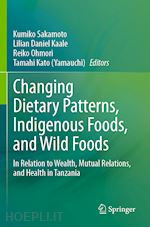
Questo prodotto usufruisce delle SPEDIZIONI GRATIS
selezionando l'opzione Corriere Veloce in fase di ordine.
Pagabile anche con Carta della cultura giovani e del merito, 18App Bonus Cultura e Carta del Docente
This book presents different dietary patterns, some utilizing wild foods and others facing drastically changing dietary patterns, and shows their implications for health in terms of wealth, mutual assistance, food sufficiency and food diversity. The book examines these globally important issues through a case study of Tanzania.
Using a novel methodology based on a global standard quality of life indicator, the book sheds light on the relationship between wild food intake and health in Tanzania. Descriptive case studies illustrate the impact of various food patterns and wild food intake on human health. It also highlights the divergence between food production sufficiency and food diversity. It then discusses the influence of wealth, mutual relations, and methods of food access. Finally, the book concludes with recommendations for maintaining good health in various environments.
The intended readers of this book are academicsand professionals in the fields of development, nutrition, and environment in East Africa. These include, but are not limited to, regional and district personnel who are actively engaged in development, relevant ministries of food and agriculture, and international organizations such as FAO, UNICEF, UNDP, and UNEP. In the academic field, students and researchers in international studies, development studies, African studies, social studies, cultural studies, nutrition, agriculture, and environmental studies are targeted.
This book won the 2024 Japan Society for International Development Committee Special Award.
Lilian Daniel Kaale is a Senior Lecturer at the Department of Food Science and Technology, University of Dar es Salaam (UDSM) in Tanzania. She holds a Ph.D. in Food Science and Engineering and currently serves as the Head of the Department of Food Science and Technology, at the University of Dar es Salaam. Dr. Kaale’s main research interests are in Food Nutrition, Food Processing (food value addition), and antimicrobial substances for food preservation and safety.











Il sito utilizza cookie ed altri strumenti di tracciamento che raccolgono informazioni dal dispositivo dell’utente. Oltre ai cookie tecnici ed analitici aggregati, strettamente necessari per il funzionamento di questo sito web, previo consenso dell’utente possono essere installati cookie di profilazione e marketing e cookie dei social media. Cliccando su “Accetto tutti i cookie” saranno attivate tutte le categorie di cookie. Per accettare solo deterninate categorie di cookie, cliccare invece su “Impostazioni cookie”. Chiudendo il banner o continuando a navigare saranno installati solo cookie tecnici. Per maggiori dettagli, consultare la Cookie Policy.